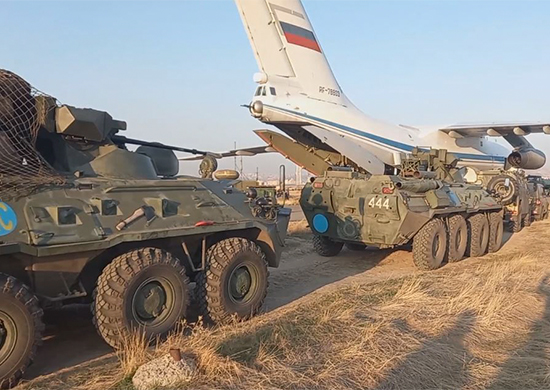Earlier this week, Armenia Prime Minister and Azerbaijan’s President, under the auspices of Russia, signed an agreement to end the military conflict over the disputed enclave of Nagorno-Karabakh. The deal took effect on Tuesday 01:00 local time.
Yet, the two sides couldn’t have reacted more differently to the peace agreement.
In Baku, Azerbaijan, the mood was jubilant. Crowds surged around “Marty’s Alley” the memorial for Azerbaijan’s fallen. They waved flags and sang the national anthem. Many younger Azeris whose parents had been forced out of Nagorno-Karabakh following the disastrous 1994 war, are preparing to return to a homeland they’ve never seen.
In stark contrast, Armenian Prime Minister Nikol Pashinyan called the deal “incredibly painful both for me and both for our people.” In Yerevan, the Armenian capital, the local media reported that a large crowd had gathered to protest against the agreement. The crowd broke into the parliament and other government buildings, shouting “We will not give it up.” Protesters also ransacked the prime minister’s official residence and Pashinyan.
The Nagorno-Karabakh region is internationally recognized as Azerbaijani territory but had been administered by ethnic Armenians since the 1994 war that resulted in a clear Armenian victory.
But this time, in the six weeks of fighting since September, Azerbaijan, with Turkish backing, routed the Armenians. Azerbaijan captured the strategic city of Shushi and was days away from taking the region’s capital of Stepanakert.
Under the agreement, Azerbaijan will hold onto the areas of Nagorno-Karabakh that it captured during the conflict. Additionally, Armenia has agreed to withdraw from several other adjacent areas over the next few weeks.
Putin and the Russian government are hailing this as a huge political victory for Russia.
Russia is a close ally of Armenia and has a base in the region. It has also a defense treaty with Armenia that nevertheless does not include Nagorno-Karabakh or the other Azerbaijani regions around it. Yet, Russia also sells arms to Azerbaijan.
“Russia managed to do what neither Trump nor Macron did — to end a war,” said Yelena Panina, a lawmaker in Russia’s lower house of Parliament. “Our country has once again reaffirmed its status as a guarantor of peace in the South Caucasus.”
Russia is already sending 1,960 troops to the area in a peacekeeping role and has landed 12 of its 22 planned aircraft loads of armored vehicles. The Russian troops will be tasked with guarding the “Lachin corridor,” which links the Karabakh capital, Stepanakert, to Armenia.
Already have an account? Sign In
Two ways to continue to read this article.
Subscribe
$1.99
every 4 weeks
- Unlimited access to all articles
- Support independent journalism
- Ad-free reading experience
Subscribe Now
Recurring Monthly. Cancel Anytime.
But the Russians won’t be the sole peacekeepers. Turkey, which lent heavy support to the Azerbaijani military during the conflict, is also sending peacekeepers. Although it isn’t quite clear yet where the Turks will be stationed.
“This is a great success,” Turkish Foreign Minister Mevlut Cavusoglu told a news conference. “Territories that were under occupation for 30 years are being taken back.”
Turkey’s involvement on the side of Azerbaijan makes Ankara a serious political and military player in the Caucasus and will only increase its influence in Azerbaijan.
With its dynamic involvement in the region, Turkey, technically a NATO member, has cut both the United States and France out of the area. The U.S., France and Russia had formed the OSCE Minsk Group that had negotiated the peace deal to 1994’s war.
This is the latest in a series of regional power plays that find Russia and Turkey backing opposing sides in a conflict. In Syria, Libya, and now in Nagorno-Karabakh, the two sides have used others to gain influence on the international stage.
The Russians are pushing back on Turkish involvement in the peacekeeping operation, stating that they were not part of Putin’s negotiations.
“Not a single word is said about this in the published statement,” Dmitri Peskov, the Kremlin spokesman, told reporters on Tuesday. “The sides did not agree on that. The presence of Turkish soldiers in Karabakh was not coordinated.”
However, the Azerbaijani President, Ilham Aliyev, said that both Russian and Turkish peacekeepers would be deployed to Nagorno-Karabakh, a move that shocked many Armenians… and Russians.
Turkish President Recep Tayyip Erdogan has won a huge political victory. Late on November 11, Turkey announced that it had signed a memorandum of understanding to set up a joint center to observe and inspect a peace agreement between Azerbaijan and Armenia.
“This center will be set up on the lands Azerbaijan has liberated from occupation. All the measures for the prevention of the ceasefire violations will be taken by this center,” Erdoğan had said.










COMMENTS